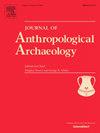Diasporic Kinship: Indentured laborers and the archaeology of relations in Mauritius
IF 2.2
1区 社会学
Q1 ANTHROPOLOGY
引用次数: 0
Abstract
This article explores the material and social relations of Indian Ocean indentured laborers in post-emancipation Mauritius. Shifting away from traditional identity categories used in archaeology, I draw on queer and diasporic frameworks to examine shared consumption practices of indentured laborers who lived and worked at Bras d’Eau, a nineteenth-century sugar estate. Through the concepts of kala pani (black waters) and jahaji-rishte (ship-relations), this article explores how laborers formed kinship bonds, negotiated caste, and expressed intimacy through everyday practices around food and watery substances. By analyzing domestic material culture and household spaces it reveals how these objects were used to reinforce social boundaries or deepen kinship ties. It concludes that while the structured caste hierarchies were mostly discarded in the diaspora, the embodied practices of purity and relationality manifested in the ways people interacted with one another in domestic spaces. The article challenges conventional notions of nuclear families and mononormative interpretations of households. Ultimately, the study argues for a rethinking of material culture to understand how social relations were materially expressed in the context of diaspora and labor migration.
散居的亲属关系:毛里求斯的契约劳工和关系考古学
本文探讨毛里求斯解放后印度洋契约劳工的物质关系和社会关系。从考古学中使用的传统身份分类中转移,我利用酷儿和散居的框架来研究19世纪在布拉德欧(Bras d’eau)糖业生活和工作的契约劳工的共同消费行为。通过kala pani(黑水)和jahaji-rishte(船舶关系)的概念,本文探讨了劳动者如何通过围绕食物和水的日常实践形成亲属关系,协商种姓,并表达亲密关系。通过分析家庭物质文化和家庭空间,揭示了这些物品是如何被用来加强社会界限或加深亲属关系的。它的结论是,虽然结构化的种姓等级制度在流散中大多被抛弃,但在人们在家庭空间中相互作用的方式中,体现了纯洁和关系的实践。这篇文章挑战了传统的核心家庭观念和对家庭的单一解释。最后,该研究主张重新思考物质文化,以理解在散居和劳动力迁移的背景下,社会关系是如何在物质上表达的。
本文章由计算机程序翻译,如有差异,请以英文原文为准。
求助全文
约1分钟内获得全文
求助全文
来源期刊

Journal of Anthropological Archaeology
Multiple-
CiteScore
4.00
自引率
11.10%
发文量
64
期刊介绍:
An innovative, international publication, the Journal of Anthropological Archaeology is devoted to the development of theory and, in a broad sense, methodology for the systematic and rigorous understanding of the organization, operation, and evolution of human societies. The discipline served by the journal is characterized by its goals and approach, not by geographical or temporal bounds. The data utilized or treated range from the earliest archaeological evidence for the emergence of human culture to historically documented societies and the contemporary observations of the ethnographer, ethnoarchaeologist, sociologist, or geographer. These subjects appear in the journal as examples of cultural organization, operation, and evolution, not as specific historical phenomena.
 求助内容:
求助内容: 应助结果提醒方式:
应助结果提醒方式:


